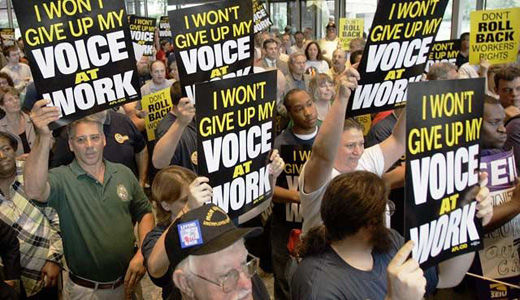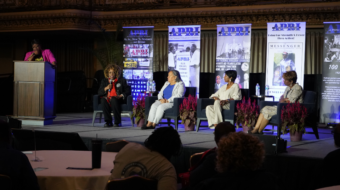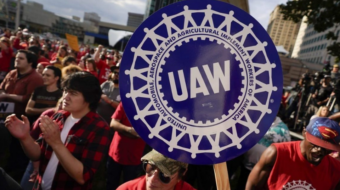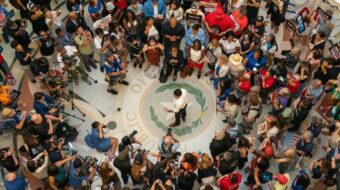
WASHINGTON (PAI) – In an attempt to help level the playing field between workers and bosses during union organizing drives, a group of 106 labor law professors and related experts formally asked the National Labor Relations Board to write a new rule giving unions equal time and an equal voice at so-called “captive audience” meetings.
Their proposal, submitted Jan. 15, would deal a key blow to employers’ anti-union diatribes. If an employer refused to give the union equal time and voice and later beat the union in a recognition election, the professors’ proposed rule would have the NLRB throw out the results as a violation of labor law and mandate a rerun, after meetings with equal time.
If the union wins a recognition vote, even without a mandated voice, there would be no penalty.
If the experts petition succeeds in producing a new rule – and a final decision on that issue could take months if not years – a key tool that vicious employers and their union-busting “consultants” use to discourage and deter unions would be weakened.
The captive audience meetings, as interpreted by the NLRB starting in with a GOP-majority board in 1953, let employers summon workers into closed meetings to hear anti-union rhetoric and worse. Unions get no right of reply. And workers who miss the meetings face company discipline and punishment.
That was not originally in labor law, even after the Republican-run 80th Congress approved the anti-worker Taft-Hartley Act in 1947, Cornell University labor law professor Kate Bronfenbrenner, one of the 106 scholars, told Press Associates Union News Service.
The proposal “takes away the scorched-earth” aspect of current captive audience meetings, Bronfenbrenner adds.
The Economic Policy Institute reports that workers in nine of every 10 union organizing drives are subjected to the captive audience meetings, which are notoriously one-sided and intimidating.
They can also include explicit or implied threats by the bosses and the “consultants” of retaliation against workers if they vote union, up to and including illegal threats of closure of the plants and loss of jobs.
The result, Bronfenbrenner found in a recent study, was a 73 percent union win rate in recognition elections without captive audience meetings, and a 47 percent win rate in campaigns that included them.
NLRB rules allow an individual person to petition the agency to rewrite federal regulations covering labor law, Bronfenbrenner explained.
Southern Methodist University labor law professor emeritus Charley Morris, Bronfenbrenner and their colleagues have been working on this proposal for several years, but chose to submit it now before the board’s membership is affected by the outcome of the 2016 presidential election, she explained.
Their proposal is sure to draw some flak. Business fought the board’s last rule changes, on union recognition election regulations, through the courts. Business ultimately lost.
“Anything that in any way makes it so that the employer cannot have the law work to their advantage will be controversial,” Bronfenbrenner said.
Photo: Keith Srakocic/AP










